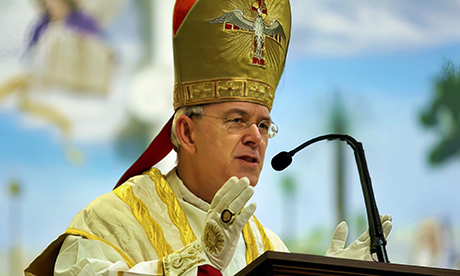Cardinal Gerhard Müller, the former head of the Congregation for the Doctrine of the Faith, has called the Synod on Synodality a potential “hostile takeover of the Church of Jesus Christ.”
Pope Francis announced last week that he is adding an extra year to the Synod on Synodality.
Pope Francis has described it as a “journey” of discernment about the future of the Church that entails lengthy “dialogue” with the laity and dioceses across the world.
So far, the synodal “listening sessions” in countries such as Germany have occasioned little more than subversion of the Catholic faith.
Müller’s fears are entirely justified.
The cardinal Pope Francis has chosen to run the Synod on Synodality speaks volumes about its direction.
He chose Jesuit Cardinal Jean-Claude Hollerich, the archbishop of Luxembourg, who is on record rejecting the Church’s perennial teaching on the sinfulness of homosexual acts.
“I think it is time for a fundamental revision of the doctrine,” he has said.
Hollerich is openly hostile to traditionalists within the Church and sees the Synod on Synodality as an opportunity for the Church to adapt to the “changing mindsets” of the modern world.
For Müller, such talk smacks of the heresy of modernism, the idea that the truth comes not from above, in the form of divine revelation, but from below through man’s “individual experience” and “self-revelation.”
Pope Francis has credited the late Jesuit Cardinal Carlo Maria Martini for influencing his thoughts on a “synodal” Church.
Martini favoured “democratising” the Church and called it “200 years out of date.”
Martini is “very dear to me and also to you,” the pope told Eugenio Scalfari, the atheistic Italian journalist.
The pope praised Martini for saying that the Church should have not just a vertical dimension but a “horizontal” one as well: “When Cardinal Martini talked about this, putting the emphasis on the councils and the synods, he knew very well how long and difficult it would be to travel the road in that direction. With prudence, but with firmness and tenacity.”
(In fact, the pope’s council of cardinals, among whom are numbered open critics of Church teaching, is an idea that came directly from Martini.)
As Müller and other bishops such as Athanasius Schneider (pictured,) note, this “listening” Church is only really interested in the feedback of liberal Catholics who clamour for changes to Church teaching.
Martini’s dream of a “permanently synodal” Church is a nightmare for faithful Catholics.
The progressives
in the Church
cast the Synod on Synodality
as a kind of de facto Vatican III
that should consolidate and augment
the liberalism of Vatican II.
It is a Church that gradually dilutes the faith.
Like the pope’s previous synod on the family, which subverted canon law’s prohibition on Communion for the divorced and remarried, the Synod on Synodality will simply undermine Church teachings.
Its loudest participants want the Church to change her teachings on everything from marriage to the male priesthood.
The self-consciously “synodal” Flemish bishops recently endorsed blessing ceremonies for homosexual couples; an outlandish move Pope Francis still hasn’t condemned.
The progressives in the Church cast the Synod on Synodality as a kind of de facto Vatican III that should consolidate and augment the liberalism of Vatican II.
Hollerich recently made the ludicrous claim that without Vatican II, the “Church would be a small sect, unknown to most people.”
The truth is the exact reverse: Since Vatican II, the Church has grown steadily weaker and less significant.
European bishops like Hollerich preside over empty pews.
Whatever its flaws, the pre-Vatican II Church had much more clout and influence than its successor. Continue reading
- George Neumayr is a senior editor at The American Spectator
News category: Analysis and Comment.




